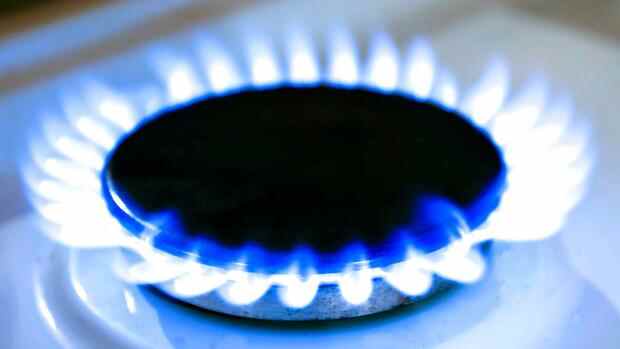A gas embargo would hit the German economy hard.
(Photo: IMAGO/Jochen Eckel)
Frankfurt The chief economists of leading insurers see a turning point for Germany’s economic model in the Russian war of aggression in Ukraine. In addition to the ongoing supply chain problems in the corona crisis and high inflation, the uncertain gas supply is one of the biggest challenges in Germany. Germany is currently experiencing its “Greek moment,” said Allianz chief economist Ludovic Subran on Tuesday at a discussion group organized by the industry association GDV.
Due to its dependency on Russian gas, the Federal Republic is facing problems similar to those in Greece during the sovereign debt crisis from 2010. In order to shoulder the energy transformation, stronger European cooperation is necessary.
“Prosperity in Germany was based on self-deception,” Subran continued. With low costs for energy, the environment and safety, people have been fooling themselves for years. The “peace dividend” was an illusion. Now the bill is presented. Germany could also get along without Russian gas, but the conversion would be expensive.
Munich Re chief economist Michael Menhart outlined Germany’s business model as follows: “It consisted of getting cheap gas from Russia, selling what we produced to China at high prices and being protected by the USA.” Now you are coming under pressure in the long term. In the case of Russian gas in particular, dependency must be completely reduced.
Top jobs of the day
Find the best jobs now and
be notified by email.
Since there are substantial upheavals in individual sectors such as the chemical and pharmaceutical industries, he can understand the German government’s reluctance to impose a gas embargo. Allianz’s Subran says the financial sanctions the West has imposed on Russia are still insufficient. Energy sanctions must now also be used more vigorously. In his estimation, however, a gas embargo would lead to an economic downturn.
Gas embargo would lead to economic downturn
Swiss-Re’s chief economist Jérôme Haegeli sees the risk of stagflation, i.e. a mixture of high inflation and economic stagnation, as even worse than a recession. This would hit the economy and households particularly hard. Economists agree that fiscal policy must play an important role in mitigating the impact on consumers and businesses in Germany.
According to Allianz chief economist Subran, Europe must also act as one. In order for Germany to succeed in the energy transition more quickly, more EU money would have to flow into the Federal Republic for a while. The insurers are also obliged to contribute to the financing of the energy transformation with their investments.
In contrast to other sectors, the direct effects of the Ukraine war on the insurance industry are manageable, the experts emphasized. According to Subran, both the business activity and the capital investments of insurers in Russia are low.
The indirect consequences – such as market distortions, business slumps and inflation – are currently difficult to calculate. 2022 will not be an easy year for the insurance industry either. The hope of a post-corona recovery “dissolved into powder smoke” with the war in Ukraine.
Swiss Re’s Haegeli expects more fluctuations on the investment side than last year. For insurers, however, he sees the increasing normalization in the interest rate environment as positive.
More: Talanx is threatened with double-digit million write-offs because of the Ukraine war
